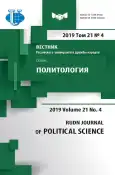The Concept of Populism in Modern Anglo-Saxon and German Political Science
- Autores: Meshcheryakov D.Y.1
-
Afiliações:
- Moscow State Institute of International Relations (University) Under the Ministry of Foreign Affairs of the Russian Federation
- Edição: Volume 21, Nº 4 (2019)
- Páginas: 755-764
- Seção: RIGHT-WING POPULISM IN THE USA AND EUROPE: ORIGINS AND MODERNITY
- URL: https://journal-vniispk.ru/2313-1438/article/view/339739
- DOI: https://doi.org/10.22363/2313-1438-2019-21-4-755-764
- ID: 339739
Citar
Texto integral
Resumo
The article examines and compares main approaches to defining populism in modern Anglo-Saxon and German political science. The author points out some similarities between two schools: increasing interest of research communities in the USA, United Kingdom and Germany in examining right-wing populism due to the electoral success of right-wing populist parties. Furthermore, among the key features of populism, both schools see the allusion to “the will of the people”, as well as juxtaposition of “the people” against “the elite”. The article emphasizes the existing reciprocal influence of the two research traditions. On the other hand, the author outlines certain differences in the two schools’ approach to populism, such as historical dissimilarities in its interpretation (in the USA the concept used to bear a more “neutral” character, while in German political science, due to the Nazi regime carryover, it was regarded mostly negatively for a long time). Also, German academic works on populism have applied rather than theoretical nature and aim at stopping the expansion of the phenomenon.
Palavras-chave
Sobre autores
Dmitry Meshcheryakov
Moscow State Institute of International Relations (University) Under the Ministry of Foreign Affairs of the Russian Federation
Autor responsável pela correspondência
Email: dmesh91@gmail.com
PhD Student at the Department of Comparative Politics, Moscow State Institute of International Relations (University) of the Ministry of Foreign Affairs of the Russian Federation
76 Vernadsky Avenue, Moscow, Russian Federation, 119454Bibliografia
- Vainshtein G.I. Modern Populism as an Object of Political Analysis. Polis. Political studies. 2017; 4: 69–89 (In Russ.).
- Lipset S.M. The Sources of the Radical Right. The New American Right. New York: Criterion Books, 1955. P. 166-233.
- Deiwiks C. Populism. Zurich: ETH Zurich and University of Zurich; 2009. Available from: https://www.ethz.ch/content/dam/ethz/special-interest/gess/cis/cis-dam/CIS_DAM_2015/WorkingPapers/ Living_Reviews_Democracy/Deiwiks.PDF. Accessed: 11.06.2019.
- Berlin I. To Define Populism. Government and Opposition. 1968; 3: 137–180.
- Canovan M. Trust the People! Populism and the Two Faces of Democracy. Political Studies. 1999; 47 (1): 2–16.
- Gidron N., Bonikovski B. Varieties of Populism: Literature Review and Research Agenda. Cambridge: Harvard University. Working Paper Series; 2013. 39 p.
- Mudde C. The Populist Zeitgeist. Government and Opposition. 2004; 39 (4): 542–563.
- Aslandis P. Is Populism an Ideology? A Refutation and a New Perspective. Political Studies. 2016; 64: 88–104.
- Hawkins K. Venezuela’s Chavismo and Populism in Comparative Perspective. Cambridge: Cambridge University Press; 2010. 290 p.
- Weyland K. Clarifying a Contested Concept: Populism in the Study of Latin American Politics. Comparative Politics. 2001; 34 (1): 1–22.
- Levitsky S., Roberts K. The Resurgence of the Latin American Left. Baltimore: Johns Hopkins University Press; 2011. 496 p.
- Tormey S. Populism: Democracy's Pharmakon? Policy Studies. 2018; 39 (3): 260–273.
- Fishman L.G. Populism is for Long. Polis. Political Studies. 2017; 3: 55–70 (In Russ.).
- Gusterson H. From Brexit to Trump: Anthropology and the Rise of Nationalist Populism. American Ethnologist. 2017; 44 (2): 209–214.
- Wilkies R., Guppy N., Farris L. Right-Wing Parties and Anti-foreigner Sentiment in Europe. American Sociological Review. 2007; 72 (5): 831–840.
- Ivarsflaten E. What Unites Right-Wing Populists in Western Europe? Re-Examining Grievance Mobilization Models in Seven Successful Cases. Comparative Political Studies. 2008; 41 (1): 3-23.
- Norris P., Inglehart R. Cultural Backlash: Trump, Brexit, and Authoritarian Populism. Cambridge: Cambridge University Press; 2019. 300 p.
- Münkler H. Populismus in Deutschland. Eine Geschichte seiner Mentalitäten, Mythen und Symbole. London: Counterpoint; 2012. 89 s. (In Ger.).
- Decker F. Parteien unter Druck. Der neue Rechtspopulismus in den westlichen Demokratien. Oplanden: Leske + Budrich; 2000. 384 s. (In Ger.).
- Nohlen D. Populismus. Nohlen D., Schultze R.-O., Hrsg. Lexikon der Politikwissenschaft. Band 2. München: Beck, 2007 (In Ger.).
- Derkach M.A. The History of Populist Parties in Sweden and Finland in 2006-2015 [dissertation]. Moscow; 2017. 266 p. (In Russ.).
- Von Beyme K. Right-Wing Extremism in Post-War Europe. West European Politics. 1988; 2: 1–18.
- Von Beyme K. Populism and Right-wing Extremism in Postmodern Party Systems. Bereginya. 777. Sova: Society. Policy. Economy. 2014; 4: 101-109 (In Russ.).
- Backes U. Extremismus und Populismus von rechts. Ein Vergleich auf europäischer Ebene. Aus Politik und Zeitgeschichte. 1990; 46-47: 3–14 (In Ger).
- Backes U. Nationalpopulistische Protestparteien in Europa. Vergleichende Betrachtungen zur phänomenologischen und demokratietheoretischen Einordnung. Österreichische Zeitschrift für Politikwissenschaft. 1991; 1: 7–17 (In Ger.).
- Patzelt W.J. Populism and how to Handle It. Populism as a Common Challenge. Ed. by K. Crawford, B.I. Makarenko, N.V. Petrov. Moscow: Political encyclopedia; 2018: 16–27 (In Russ.).
- Grabow K. Right and National Populism in Western Europe. Populism as a Common Challenge. Ed. by Crawford K., Makarenko B.I., Petrov N.V. Moscow: Political encyclopedia; 2018: 58-67 (In Russ.).
- Müller J.-W. What is Populism? Moscow: HSE Publishing House; 2018. 144 p. (In Russ.).
- Funke H., Rensmann L. New Right-wing Populism in Europe: A Comparative Analysis of Political Parties and Movements. Actual Problems of Europe. 2004; 2: 74–98 (In Russ.).
- Diehl P. Die Krise der repräsentativen Demokratie verstehen. Ein Beitrag der politischen Theorie. Z. Politikwissenschaft. 2016; 26: 327–333 (In Ger.).
- Arzheimer K. Contextual Factors and the Extreme Right Vote in Western Europe 1980-2002. American Journal of Political Science. 2009; 53 (2): 259–275.
Arquivos suplementares









